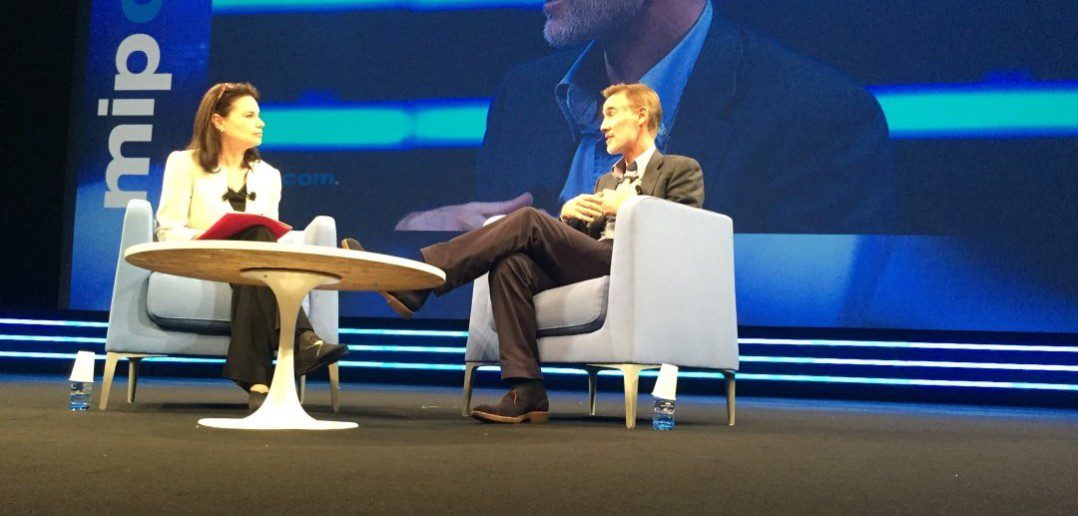In a conversational interview, Adam Crozier, CEO of ITV fielded questions from group editorial director Anna Carugati of World Screen. In this revealing discussion, find out how ITV built an international content business in just a handful of years.
A handful of years ago, “while things were in terrible shape, ITV was still a fantastic brand with a great heritage,” Crozier began. “We were in every living room in the UK every week, with a fantastic share of advertising: 48% of all TV advertising in the UK. So although there was a lot wrong, there was a lot to build on as well.”
Today ITV is worth £10-11 billion, he revealed. “We’ve seen a real transformation in our creative and financial fortunes.”
Asked by Carugati what the company’s goals were, and how it delivered against them, he admitted that ITV had a problem endemic to many similar companies of its size and scope: They would define goals, then fail to effect real change. Much of the real work involved creating building blocks that enabled them to transform little by little.
Empowering creativity was a huge part of that.
“We brought in great creative leadership and in lots of creative talent by whatever means necessary,” either by hiring or acquiring companies, Crozier said. It also chose to focus on key genres like drama and scripted work, formats that can travel, working more closely with writers, and “taking advantage of this thing we have, which is that we’re an integrated producer-broadcaster.”
In other words, “we really built it piece by piece,” Crozier said. “We’re the biggest commercial broadcaster in the UK and third-biggest in Europe. Over half our revenues now come from outside the UK. We’ve turned it into a genuine global business.”
Going international, with a particular focus on America, was also a priority.
“It’s hard to believe that five years ago we had no script teams in the US at all, and only three in the UK. We’ve grown our resources and really invested. Now we have great dramas that people are aware of, like Endeavour or Louis, and fantastic new work like Beowulf and Jekyll & Hyde. In the US we’ve had Aquarius, The Good Witch, Texas Rising, with others to come.”
Carugati then focused on ITV’s recent acquisition spree of numerous production companies, including Left Field in the US and Mammoth Screen in the UK.
“It’s all about having the best creative talent working as part of ITV,” Crozier replied. “Creative talent works best in an environment in which it can really thrive, so we run them all as labels and try to give people creative and entrepreneurial freedom to work.” He added, “There’s no shortcut to scripted success; you’ve got to invest, have talent there, and take your time to nurture them.”
Beowulf, announced at MIPCOM this week, is a good example: “It’s a brand everyone has heard of” that can travel internationally. It also features medieval and fantastical elements (popularised by hits like Game of Thrones), but is also an old, beloved story with built-in interest.
Caligari then moved on to ITV’s activities in America, which she noted is “vast, diverse, lucrative… and ITV is the largest supplier of non-scripted programming in the US.”
“The US market is the biggest and most successful market in the world in our industry. To really grow, we felt we had to have a real scale and presence there,” said Crozier. “We’ve built our presence by working with great people over a number of years, and we want to be in all the genres, so we’re very strong in unscripted. And we’re moving into scripted with some success.”
ITV’s strengths as both producer and broadcaster helped immensely. “We instinctively know what broadcasters are looking for and can often work in partnership with them on projects. Equally, we don’t compete as a broadcaster in their market so we can work with all the networks. We currently work with 45 networks at any given time and cross over all the genres,” Crozier said, pointing to ITV’s unique ability to hand-select the content that makes the most sense of them.
Caligari asked how ITV managed to weather recent difficulties in the UK ad market.
“There was the collapse in 2008-2010 and it was flat for some time,” he reflected. “Last year it started to grow, and this year there’s good growth across all ad sectors. That’s partly because the economy itself is returning to growth. Most companies, having cut costs, are now under pressure to grow their top line and revenues. The quickest way is to get behind their existing brands, and to get behind and promote them,” he observed.
Crozier went on, “TV advertising is still remarkably cost-effective compared to other media, and has an unrivalled ability to reach mass audiences. If you look at our ability to deliver those mass audiences, we are responsible for 100% of all commercial programmes with an audience of over 7M, and 98% with an audience of over 5M.”
For this reason, ITV thinks primarily of advertisers when building its schedule.
He also admitted that ITV’s ratings were a bit droopy in early 2015, and the company moved quickly to course-correct. “Where we lost out earlier in the year wasn’t on the glamorous stuff, like drama and scripted; it was because our daytime shows, like soaps, didn’t perform as expected. Some of the sport didn’t perform so well. So we’ve concentrated on fixing those, and daytime’s been consistently up: A really strong schedule with Downton Abbey, there’s rugby on now, Jekyll & Hyde will come soon. We’re in really good shape for the autumn.”
On whether Crozier believes the :30 spot is dead, Crozier replied, “TV is without a shadow of a doubt the most powerful media in the world, and the :30 spot is still vitally important.” He added, “Any advertiser would love to be able to do what we do.”
But it won’t do to be complacent. “We have to get more creative and help others stand out from the crowds,” he continued, “whether it’s letting people Shazam an ad, or using other apps or devices. All of these are ways of engaging with the advertiser, and increasingly you’ll have to do that. And increasingly advertisers will use the data we’re building. In 5 years time, all that data will be incredibly valuable.”
With this laser-focus on television, Caligari pointed out that ITV does have digital channels, and asked how they work with the flagship channel.
“It’s not just the programmes themselves that bring large audiences,” Crozier began. “I don’t believe channel brands are by any means dead.”
ITV segments channels to provide something for everybody—like ITV4 for men, and ITVB for females. “Our job is to provide a mix of audiences so we can take as big a share of advertising as possible. So we do it through targeted channels and targeted programmes.”
But being very good and very popular at the same time is hard to do. The first step to success, according to Crozier, is nailing down those watercooler moments with shows like Britain’s Got Talent, which “everyone wants to watch and talk about the next day.”
The second step is strong channel brands; thirdly, it’s become primordial to use social media strategically. “60% of all social media traffic on the weekend is about TV programmes, so it’s a real driver of viewing,” said Crozier.
“I also think you have to be prepared to try different things online.” For example, last year ITV changed all its mobile player apps so that when you access them, you immediately fall on a live TV feed.
“Younger people don’t see their phone or tablet as a second device; they just see it as a TV screen. It’s important to see it that way,” said Crozier.
He also advocates experimenting with how you deliver content to people. “When you work in different industries, you learn that the viewer will always find the most convenient and the cheapest way to access what you do. So you can’t fight it. We’ve tried previewing content online, making whole series available online, and the really interesting thing is it doesn’t negatively impact share of viewing on linear channels. If anything, it helps improve it because it creates WOM and people talking about the programme itself.”
All in all, he thinks TV viewing is vastly under-measured. “That will be fixed as we measure across all these different platforms,” said Crozier, who observed that people “love” to watch television. “As long as TV companies invest heavily in great, new original content, they will be successful. The way people consume that may change over time, but that desire for great content will never go away.”
It doesn’t matter how a media company starts its life; whether as a telco, a network, or an OTT. “Whatever your set of pipes is, the key differentiator will be what you have in those pipes,” Crozier concluded.




